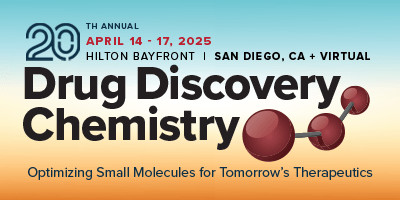2025年 培训研讨会(仅限面对面实体会议)
Cambridge Healthtech Institute的培训研讨会提供涵盖了广泛的学术理论及其背景,以及现实生活中的案例研究和所面临的挑战及适用的解决方案资讯。每个培训研讨会都结合了正式讲座与互动讨论和活动,以让学习成果最大化。以熟练的讲师来主持培训研讨会,以适用于当前研究的内容,并为该领域的初学者提供重要指导。以目前研究的内容为焦点,提供针对在该领域的初学者重要的指南。
Drug Discovery Chemistry的培训研讨会仅限面对面实体会议。
2025年4月15日(星期二)上午 8:00 - 下午 3:35 | 2025年4月16日(星期三)上午 8:00 - 下午 12:00
TS6A: The Medicinal Chemistry-Pharmacology Interface: The 3 Independent SARs for New Drug Candidates
Seminar Outline:
Day 1 (AM): SAR 1: Primary Target Activity
- Affinity: What concentrations are needed in the receptor compartment for target binding?
- Efficacy: How do drugs produce cellular response (drugs have many efficacies)? How the combination of signaling effects yields a ‘quality’ of efficacy to cells.
Day 1 (PM): SAR 1: Primary Target Activity (cont.)
- Efficacy/how biased-signaling causes complex patterns of efficacy (and how can this be manipulated?).
- Allosteric vs. orthosteric interaction of molecules: how allosteric interaction fundamentally differs from orthosteric (same site) interaction.
- Kinetics of ligand interaction for in vivo target coverage: the importance of in vivo–restricted diffusion/importance of receptor offset rates for target coverage (PK-PD dissociation)/methods to measure kinetics.
Day 2 (AM): SAR 2—Pharmacokinetic Profile and SAR 3—Safety
- SAR 2 (ADME): Methods for modification of candidate ADME properties (modification of ‘druglike’ activity/specific modification of interactions with recognition processes (i.e., hepatic enzymes, transporters).
- SAR 3: Safety: Basic safety issues faced early on (cytotoxicity, hepatotoxicity, hERG, Ames test)/translation of in vitro to in vivo activity.
INSTRUCTOR BIOGRAPHIES:
 Terrence P. Kenakin, PhD, Professor, Pharmacology, University of North Carolina at Chapel Hill
Terrence P. Kenakin, PhD, Professor, Pharmacology, University of North Carolina at Chapel Hill
2025年4月16日(星期三)下午 1:30 - 5:45 | 2025年4月17日(星期四)上午 10:15 - 下午 5:40
TS6B: Drug Exposure at the Target: The Role of ADME and Pharmacokinetics
Session 1
- Drug discovery: typical order of operations
- ADME and key pharmacokinetic parameters
- Modeling Cp-time curves from an IV dose
- Modeling Cp-time curves from an oral dose
Session 2
- Oral drug space and membrane permeability
- Metabolic stability and intrinsic clearance
- Plasma, PPB, and the free drug hypothesis
- Compartment models
Session 3
- Preformulation and formulation
- Preclinical species and PBPK
- Non-small molecule drug modalities PK/PD modeling
INSTRUCTOR BIOGRAPHIES:
 Erland Stevens, PhD, James G. Martin Professor, Department of Chemistry, Davidson College
Erland Stevens, PhD, James G. Martin Professor, Department of Chemistry, Davidson College
* 活动内容有可能不事先告知作更动及调整。
2025年 4月 14日

降解剂和分子胶:超越肿瘤学

基于共价键结/邻近导引的治疗

生成式 AI 和预测建模

女性健康用药物研发

RNA修饰的小分子药物
2025年 4月 15 - 16日

降解剂和分子胶 - PART1

片段药物发现(FBDD)

用于早期药物发现的AI/ML - PART1

GLP1・口服胜肽

发现化学的新兴技术
2025年 4月 16 - 17日

降解剂和分子胶 - PART2

蛋白质间相互作用(PPI)

用于早期药物发现的AI/ML - PART2

DEL(DNA-Encoded Library)

转录因子和调节因子的给药








